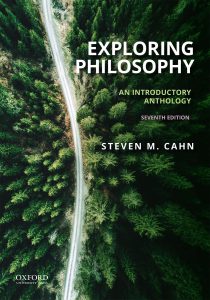Reasoning About Philosophical Issues
What If, What Is, What Is Not
Professor Kiehl Spring Semester 2024
Philosophical questions frequently arise when we are faced with change that greatly affects our lives. We become uneasy about the future, and wonder “what if…?” In pondering such “what ifs”, philosophers are brought to the fuzzy edges of what is and what is not. Fuzzy edges are there because the philosopher must also face what can be and what cannot be, what should be and what should not be. Opposing views to philosophical questions create philosophical issues, to which the dialectical method must be applied. Dialectic uses argument and counterargument to examine and explore philosophical issues. The goal of this method is to discover the truth of the matter. In this course we will examine various arguments that have been given in this dialectical exchange to determine whether they are based on sound reasoning.
The recent coronavirus pandemic has changed lives by causing death, economic hardship, and the loss of personal freedom. Globally, we are experiencing the effects of climate change. Closer to home, we are confronting the effects of the Dobbs decision. Although the wars in Ukraine and the Gaza strip are miles away, they too affect us and raise moral issues. Whether it be disease, global warming, abortion, or war, death seeps into our thoughts raising an age-old philosophical question: what is morally right? In exploring this, other questions arise: is it rational to fear death? what is the meaning of life, do we have free will? Underlying these questions is the question of personhood: what is it that fears, finds meaning, makes choices and wills itself to act?
Required Textbook
Steven Cahn, Exploring Philosophy: An Introductory Anthology, 7th ed., New York: OUP, 2021
This course fulfills a critical thinking requirement for Gen Ed and CSU Gen Ed.
The Peculiar, The Pandemic, & Pandemonium
Professor Kiehl Spring Semester 2022
In the fall of 2019, a novel virus was detected. By the spring of 2020, this coronavirus became a pandemic, shuttering the world, causing death, economic hardship, and the loss of personal freedom. As we suffer through this pandemic, resistance to the paternalistic public health regulations enacted to prevent the spread of disease is evident. Opposition to getting a vaccine is often expressed by “I have a right to choose what to do with my own body.” Opposition to wearing a mask is often accompanied by the claim “I am not afraid to die.” This latter claim is our starting point as we examine and explore these philosophical issues: is it rational to fear death, what is the meaning of life, do persons have free will, and if so, from what must they be free? Finally, we turn to what fears, finds meaning, makes choices and wills itself to act. About this, we ask, “what is a person?”
Required Textbook
Steven Cahn, Exploring Philosophy: An Introductory Anthology, 7th ed., New York: OUP, 2021
This course fulfills a critical thinking requirement for Gen Ed and CSU Gen Ed.
Reasoning About Philosophical Issues
Pandemic & Personal Freedom
Professor Kiehl Spring Semester 2021
By the spring of 2020, the novel coronavirus became a pandemic, shuttering the world, causing death, economic hardship, and the loss of personal freedom. As we suffer through this pandemic, resistance to the paternalistic public health regulations enacted to prevent the spread of disease is evident. Opposition to wearing a mask is often accompanied by the claim “I am not afraid to die.” This claim is our starting point as we examine and explore philosophical issues such as: what is a person, what is the difference between negative and positive freedom, do persons have free will, and if so, from what must they be free?

Required Textbook
Steven Cahn, Exploring Philosophy: An Introductory Anthology, 6th ed., New York: OUP, 2018.
This course fulfills a critical thinking requirement for Gen Ed and CSU Gen Ed.
****************************************************************************
Reasoning About Philosophical Issues
Ok, Boomers!
Professor Kiehl Spring Semester 2020
In 2019 the “OK, Boomer” meme went viral. Yet the social problems that challenged the Boomers, also challenge today’s Millennials and Generation Z. This class will explore whether the underlying philosophical issues of these social problems have changed since the Boomer generation.
Required Textbook
Steven Cahn, Exploring Philosophy: An Introductory Anthology, 6th ed., New York: OUP, 2018.
Reasoning About Philosophical Issues
Machines, Morality, and Mortality
Professor Kiehl Fall Semester 2018
This course examines our willingness to outsource moral decisions to machines with artificial intelligence, our willingness to have end of life options, our willingness to plan families. We will explore what this willingness tells us about ourselves, our views of mortality, our status as persons, and moral agency in general.
This course fulfills a critical thinking requirement for Gen Ed and CSU Gen Ed.
Reasoning About Philosophical Issues
Intuitions, Bots, and Mortality
Professor Kiehl Spring Semester 2018
This course examines our willingness to outsource moral decisions to machines with artificial intelligence. As we become accustomed to self-driving vehicles, bots ordering products, drones delivering packages, and robots with AI competing for jobs once solely held by humans, we should reflect on what this means for humanity. We will explore what this willingness tells us about ourselves, our views of mortality, our status as persons and moral agency in general.
This course fulfills a critical thinking requirement for Gen Ed and CSU Gen Ed.
Reasoning About Philosophical Issues
Death, Freedom, and Persons
Professor Kiehl Fall Semester 2017
This course begins with the recent news of a young newlywed with terminal brain cancer who decided to end her life under Oregon’s Death with Dignity Act. After a brief examination of arguments relating to the value of death and the meaning of life, we explore the philosophical issues of immortality, personal identity, and free will.
This course fulfills a critical thinking requirement for Gen Ed and CSU Gen Ed.
*********
|
|
|
|
|
|
|
|

